“What are nightshades?” And, “Are nightshades bad for me?”
I recently published THESE 9 ways to troubleshoot the leaky gut meal plan.
Here is number 4:
Nightshades
The meal plan includes many nightshades because they are “healthy’ for most. For a certain population, though, they are damaging and inflammatory; with a leaky gut, that might be you. Nightshades are things like tomatoes, peppers, and potatoes (white, not sweet potatoes).
Today I want to discuss more about nightshades.
What are Nightshades?
Click HERE to save this post for later.
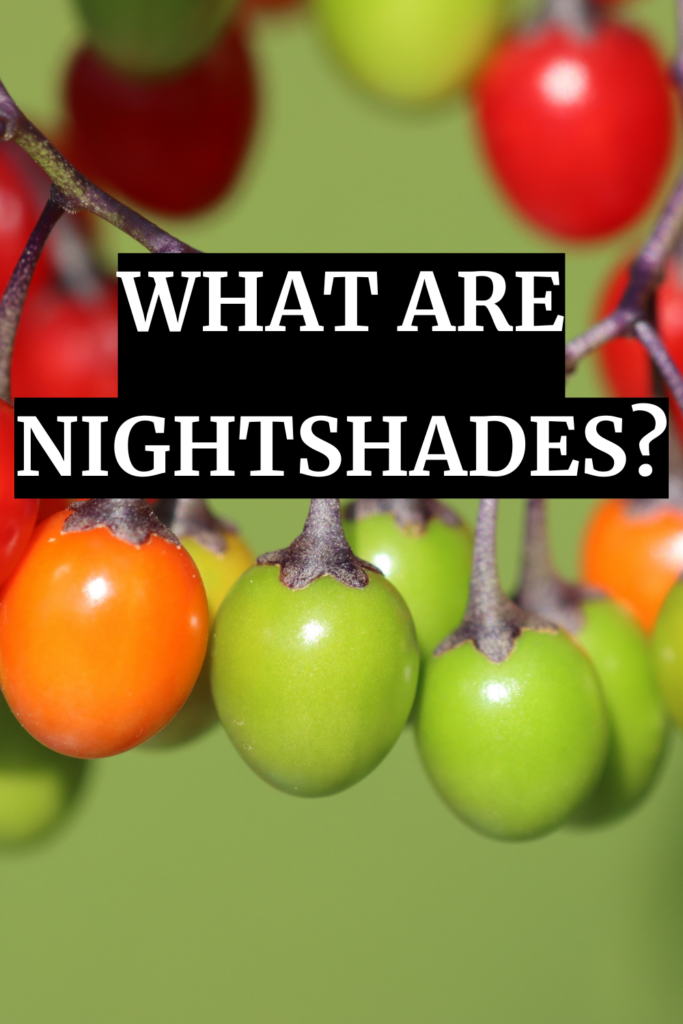
The origin of the name “nightshade” is not clear, but some suggest the name describes how these plants prefer to grow and flower in the night and shade.
Others suggest that it’s due to their “deadly” properties, as described below.
What is a Nightshade?
Nightshades belong to the Solanaceae plant family.
The poisonous alkaloids present in some species of the family have given the latter its sombre vernacular name of “nightshade.”
But let me be very clear; the edible nightshades listed below are not poisonous and deadly.
However, with more than two-thousand plant species in the plant family, a majority are deadly (like deadly nightshade, jimsomweed, and Atropa belladonna).
It’s the nightshade plants that can be fatal and typically affect animals like horses and cows who might eat them.
What are Nightshades Vegetables?
Not all nightshades are vegetables; see below for a list of nightshades.
A tomato, while many think it’s a vegetable, is actually a fruit. The Goji berry is also a fruit. There are also herbs and spices among the list.
Nightshade, in other words, is not synonymous with vegetable.
Nightshades are Not Harmful
According to various diets, yes they can be harmful.
However, the other side of the coin is that they are not harmful.
According to Cleveland Clinic,
Research hasn’t concluded that they are harmful.
In fact, many nightshades provide a lot of nutritional benefits. Bell peppers contain a highly concentrated source of vitamin C. Tomatoes are a great source of biotin and lycopene.
Many nightshades are very good sources of fiber and contain a high amount of nutrients in general.
So then why would any diet say that a nightshade is harmful?
Nightshades are Harmful
Truth be told, you might actually need to avoid nightshades.
Alright, let’s go back to the main difference between gut health and gut healing.
What the Cleveland Clinic was referring to is gut health.
When anyone tells you that nightshades are harmful it’s because they assume you need to heal your gut and have a specific condition.
I see you with that confused look on your face because no, no they don’t truly know the state of your gut.
Which is why, again, only you can know if nightshades are harmful or not to you…..not any sort of diet.
Nightshades can be harmful if you have an autoimmune disease and/or some other digestive-specific condition which does not tolerate them.
According to the Paleo Mom, they can be harmful due to the glycoalkaloid content. She states,
Over-consumption of these edible species can actually be poisonous to anyone, and it is possible that the low-level toxic properties of nightshade vegetables contribute to a variety of health issues over time.
Black Nightshade
Now, black nightshades are harmful.
In fact, they can be deadly.
Black nightshade is one of the most problematic of the nightshades.
They, and other nightshade species, can harbor diseases and pests that affect closely related crops such as tomatoes, potatoes, and peppers.
However, unless you are walking around in nature and pick one, you’d never intentionally be given a black nightshade to eat.
Nightshade Allergy
While most are referring to negative effects of nightshades due to intolerance, there is also the possibility of a nightshade allergy.
However, most likely you would know if you had an allergy to nightshades.
Some reactions that might indicate an allergic reaction to nightshades include:
- hives and skin rashes
- vomiting
- excess mucus production
More on Alkaloids vs. Glycoalkaloids
In context|organic chemistry|lang=en terms the difference between alkaloid and glycoalkaloid (saponins) is that:
- alkaloid is (organic chemistry) any of many organic heterocyclic bases, that occur in nature and often have medicinal properties
- Glycoalkaloid is (organic chemistry) any of a class of alkaloid glycosides, most of which are poisonous. They are a class of nitrogen-containing compounds with a steroid scaffold coupled to one or more monosaccharides
Alkaloids are a chemical compound. Glycoalkaloids are found in some of them.
They include:
- solanine (in potatoes, especially green potatoes)
- nicotine (in very small amounts: nightshade plants are not addictive like cigarettes!)
- capsaicin (the chemical that gives peppers their heat)
Glycoalkaloids have a stereoalkaloid nucleus, which is attached to a sugar side-chain.
Their role is to protect the plant from insect attack.
When α-solanine and α-chaconine are consumed at low doses, these glycoalkaloids may cause gastrointestinal disturbances, e.g., vomiting, diarrhea, and severe abdominal pain.
Another Reason Nightshades Might be Harmful
In addition to the above, some might not tolerate nightshades due to lectins.
Lectins
All lectins are not considered harmful. But as they relate to nightshades, they may have the ability to increase intestinal permeability (aka leaky gut). The Paleo Mom states,
Tomato lectin is known to enter the blood stream relatively quickly in humans, which suggests that tomato lectin can contribute to the development of a leaky gut 2. This information has led me to recommend that tomatoes should be eaten in moderation for most people. People with autoimmune disease are more likely have a leaky gut and have more challenges to healing a leaky gut once it has developed. For these sensitive individuals, tomato lectin should be avoided.
Comprehensive Nightshades List
Click HERE to save this list for later.
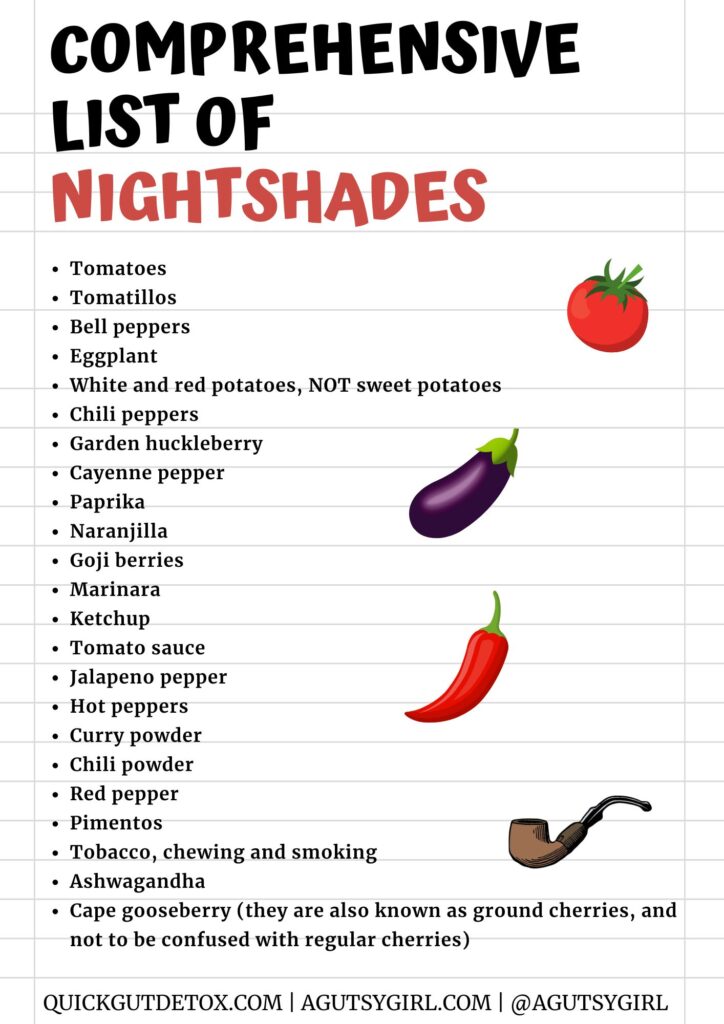
- Tomatoes
- Tomatillos
- Bell peppers
- Eggplant
- White and red potatoes, NOT sweet potatoes – whew, right?!
- Chili peppers
- Garden huckleberry
- Cayenne pepper
- Paprika
- Naranjilla
- Goji berries
- Marinara
- Ketchup
- Tomato sauce
- Jalapeno pepper
- Hot peppers
- Curry powder
- Chili powder
- Red pepper
- Pimentos
- Tobacco, chewing and smoking
- Ashwagandha
- Cape gooseberry (they are also known as ground cherries, and not to be confused with regular cherries)
And remember, any products ((like ketchup and tomato sauce from above plus baba ganoush (eggplant dip)) would also be a nightshade because their ingredients include a nightshade food.
This list was taken from A Gutsy Girl’s Bible: a 21-day approach to healing the gut.
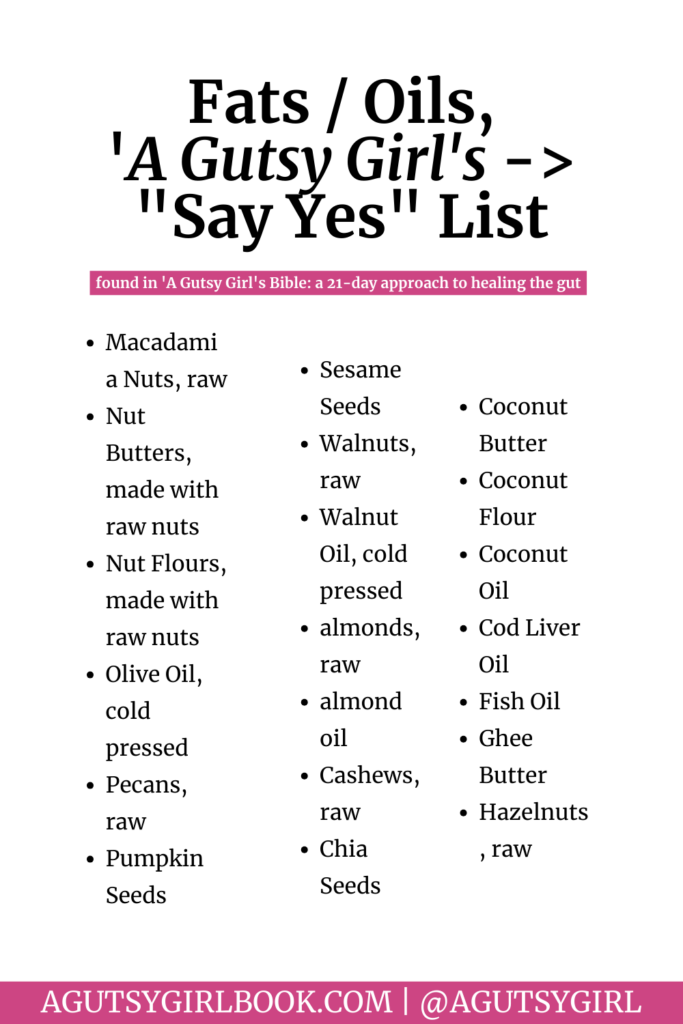
Are Nightshades Affecting Me (from allergy or intolerance)?
Here is a list of symptoms you might be experiencing if nightshades are potentially affecting you:
- hives and/or skin rashes
- bloating
- itchiness
- gas
- excessive mucus production
- achy muscles
- diarrhea
- nausea
- fatigue
- joint pain or swelling
One way to know if they are affecting you is to join the 21-Day Quick Gut Detox.
How to Prepare Nightshades if You Want to Eat Them
(but have gut issues and/or an autoimmune condition)
Like with almost everything else, where there is a will, there is a way.
Here are some tips for preparing various nightshades:
- Simply peeling a 1.5 mm layer of skin from the potato can remove up to 50–95% of the glycoalkaloids.
- Avoiding green tomatoes and green and/or sprouting potatoes (unripe nightshades are higher in alkaloids).
- Cooking nightshade vegetables whenever you eat them (this reduces alkaloid content further). One study showed that the total glycoalkaloid content of potatoes was lowered by 40% after only 10 minutes of baking at 410°F (210°C).
Personally, I believe that the microbiome is much happier when we don’t cut out nightshades, as there are so many health benefits to them.
But remember, the best way to know if you can or cannot tolerate them is to keep meticulous track. Seriously.
Grab my PDF e-journal HERE, or grab the printed copy and get started.
Other sources: HERE, HERE, HERE, HERE, HERE, and HERE.
If you liked this post, you might also enjoy:
- Antinutrients Information for Your Gut Healing Journey
- A Gutsy Girl’s Master Resource
- The Master Gutsy Spreadsheet
Xox,
SKH
🤰 bloating be gone! weight loss through optimal gut health for women
💃ʜᴇᴀʟ ʏᴏᴜʀ ɢᴜᴛ. ʜᴇᴀʟ ʏᴏᴜʀ ʟɪfe.
🫶🏻 founder gutbyome.com


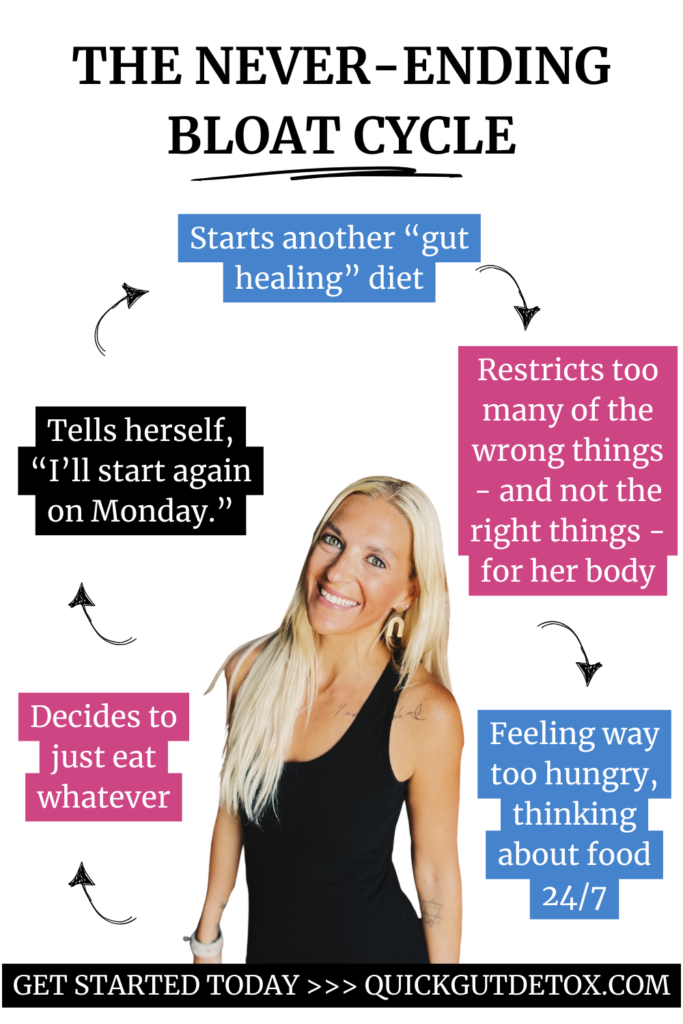

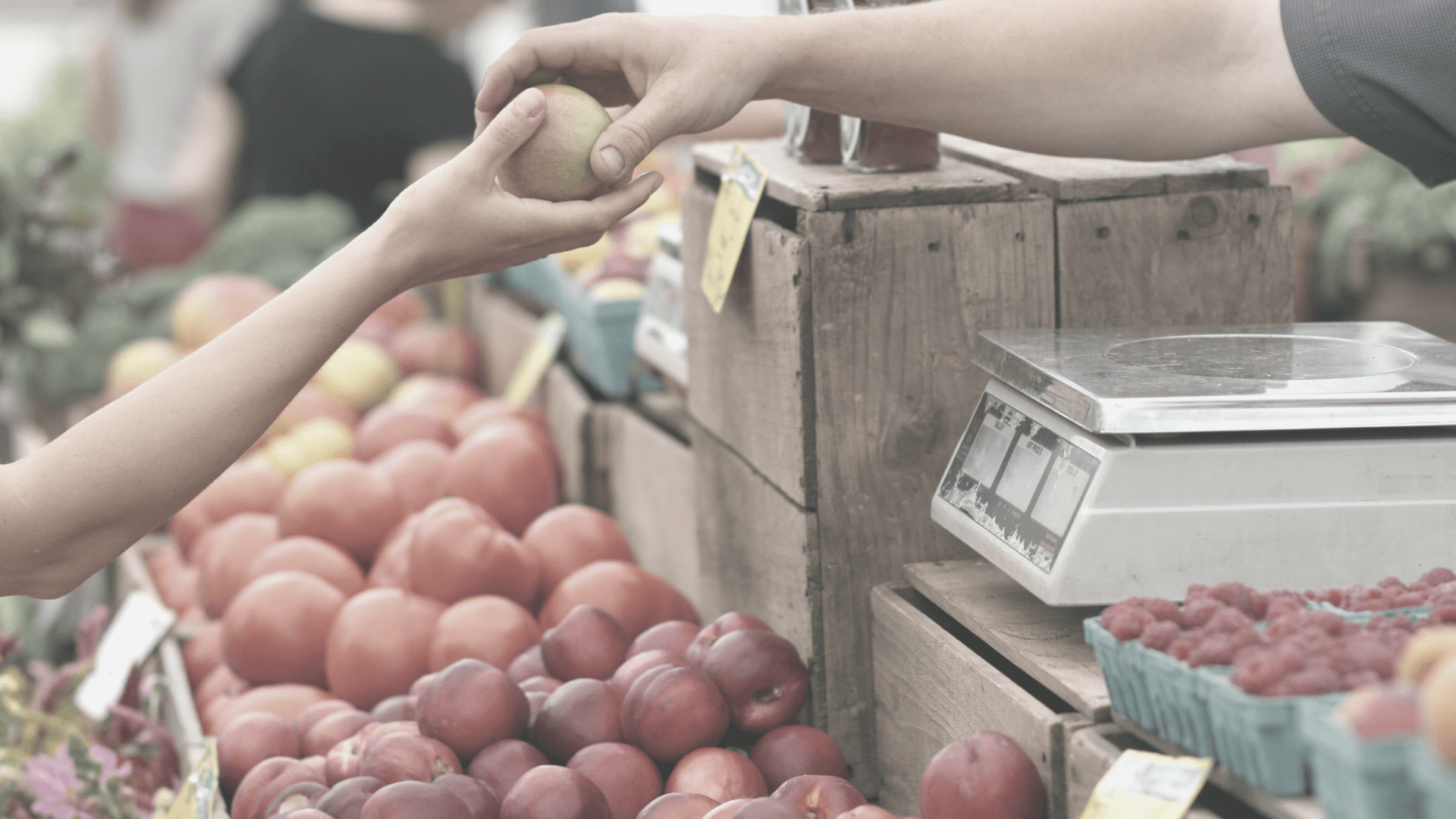
![IBS vs IBD [What’s the Difference]](https://agutsygirl.com/wp-content/uploads/2019/08/reflux-featured-agutsygirl.com_.png)
![13 Best Paleo Bars [that are also high protein]](https://agutsygirl.com/wp-content/uploads/2017/05/paleo-bars-featured-agutsygirl.com_.png)

